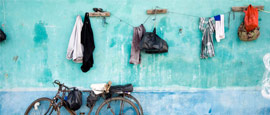Getting around Jakarta
Jakarta’s Bus Rapid Transit (BRT) system (tel: +62 21 8087 9449; www.transjakarta.co.id), also known as Transjakarta Busway, is overcrowded and inefficient. There are 12 main routes, three of which run for 24 hours a day. A compulsory prepaid e-ticketing system has replaced Transjakarta’s old paper tickets. You have to buy cards at local banks, which can be topped up with credit at all bus stops.
In addition, the city has a fleet of chronically overcrowded angkots (minibuses), though they have no schedule, fixed stops or air conditioning.
A monorail project was re-launched in 2013 after being abandoned in 2008, but was cancelled in 2015 due to commercial development disputes along the intended line.
A 16km (10-mile) urban railway, known as the MRT (www.jakartamrt.co.id) is under construction; the first phase, with 13 stations, is expected to open in August 2017 and the second, with a further eight stations, in 2018.
Taxis are considered the best way of getting around Jakarta, and although flagging one down in the street may be easy, you set yourself up for being ripped off. Book one at a hotel or a shopping mall’s pangkalan (taxi queue) instead.
The most reputable companies are Blue Bird (tel: +62 21 4682 2345) and Express Taxi (tel: 150 0122, in Indonesia only). Make sure drivers use the meter. It also helps to know a bit of Bahasa Indonesia as many drivers determine your familiarity with Jakarta by gauging your language skills. If you appear lost in tongue then you could be taken for a ride. Tipping is not expected though at times the driver will make you feel it’s required.
Hiring an Ojek (motorcycle taxi) is much faster than getting around by taxi, though not for the faint-hearted. They usually hang out in front of bus stops or terminals. Be sure to pick one with a helmet on offer, or face a fine from the police.
Bajaj (Indonesian tuk-tuks) are motorised rickshaws that can be hailed in the street. They fail to separate passengers from the elements, but are cheap to hire.
Vehicles in Jakarta move at an average of 10-12 kph (6-8 mph) during peak times. This is the slowest among all the Southeast Asian capitals. Driving can be dangerous due to poor local driving standards and tolls are collected on major roads. To dissuade drivers from commuting by car, parking is expensive.
A number of car hire companies have offices in Jakarta including Avis (tel: +62 21 314 2900; www.avis.co.id), , Trac Astra Rent a Car (tel: +62 21 877 877 87; www.trac.astra.co.id).
Zoe Car Booking (tel: +62 9108 6023; www.zoecarbooking.com) will arrange car rentals with a driver.
You must be at least 25 years old to hire a car and have held your licence for at least a year. Some companies will rent to younger drivers, but charge an extra fee.
Cycling on Jakarta's busy streets is not recommended. Attempts have been made to increase the amount of cycle lanes and to promote cycling as a way to ease the city's congestion, but Jakarta's City Council have refused funding. In the meantime, there are no official cycle rental companies in the city, but hawkers do rent out ontel (old bicycles) by the hour around Fatahilah Square.
Do you have any Feedback about this page?
© 2026 Columbus Travel Media Ltd. All rights reserved. No part of this site may be reproduced without our written permission, click here for information on Columbus Content Solutions.




 You know where
You know where